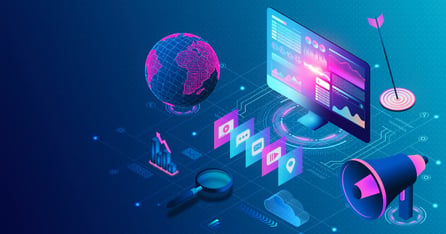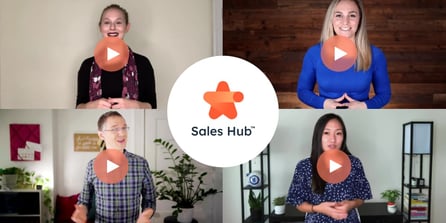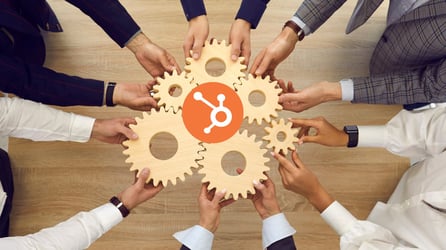Boosting Sales with AI-Powered CRM: The Power of HubSpot
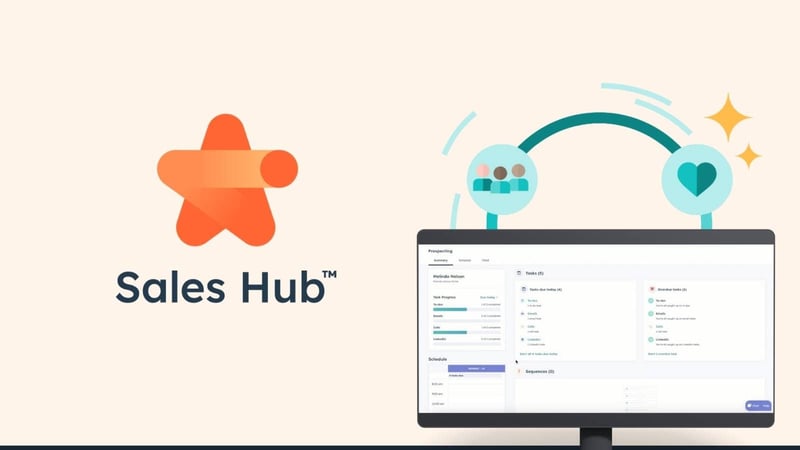
In an constantly shifting market landscape, B2B sales leaders need innovative ways to enhance their team's performance and drive revenue growth. Recent advancements in artificial intelligence have given us AI-powered CRMs — and the next big opportunity for B2B sales teams to achieve outsized results.
In this article, we delve into how B2B sales leaders can reinvigorate teams and boost revenue by leveraging the power of an AI-powered CRM. We’ll look at how to best capitalize on its many advantages and choose the solution that best fits your business, helping you elevate sales to new heights.
The benefits of AI-driven CRM
AI-powered CRMs bring a multitude of benefits to the table. Their actionable insights enable you to make data-driven decisions, personalize customer interactions, enhance lead qualification, and automate administrative tasks — so your sales team can focus on what they do best — selling. Breaking down the benefits:
1. Enhanced lead scoring and qualification
These essential sales and marketing workflows allow you to prioritize your efforts effectively, ensuring you target the best prospects.
Lead scoring assigns point values to each prospect based on factors from their engagement level and online behavior to the nature of their company.
For example, if they click on a marketing email and attend one of your company webinars, that raises their score. Other factors in lead scoring might include the prospect's company size, their company role and their industry.
Lead scoring is part of the broader process of lead qualification and happens earlier in the sales pipeline, so you can better quality your lead — and decide if it’s worth putting company resources into.
A lead that aligns closely with the company's target audience or buyer persona and has a high score could be prioritized for further engagement by the sales team.
With an AI-powered CRM like HubSpot, your lead qualification process is transformed. HubSpot’s predictive lead scoring automatically scores leads based on their likelihood to convert into customers.
Unlike traditional lead scoring models that rely on manual inputs and predefined rules, it analyzes hundreds of data points in real time — demographic information, behavioral signals, social media activity, and past interactions with your business. The system recognizes patterns and predicts future behavior.
AI also eliminates the guesswork, bias, and simple human error that can creep into manual lead scoring, so sales teams can focus on leads the model identified as the most promising, saving time and resources. As you close more leads and get more customers, you collect more data — which continuously improves the predictive lead scoring model in a virtuous cycle.
2. Personalized customer interactions
Even in the B2B space, buyers expect businesses to understand their unique needs and preferences and deliver personalized experiences accordingly. AI-powered CRM systems like HubSpot are well-equipped to meet this demand.
HubSpot's AI-powered Smart CRM unifies, enriches, and de-duplicates customer data across all of the platform’s Hubs. It provides a single, comprehensive view of each customer, including their past interactions with your business, their preferences, and their behavior patterns. This detailed understanding allows your sales team to personalize their interactions with each customer.
HubSpot's CRM also leverages AI to improve email content and develop ideas for blog posts. By analyzing customer data and past engagement metrics, an AI-powered CRM like HubSpot can suggest content that is most likely to resonate with each prospect, helping you quickly build personalized website content (and other communications) for different audiences, with tailored messaging that best meets each group’s specific needs and interests.
Then, using HubSpot’s Smart Content features in Marketing Hub, you can personalize website content for each visitor based on their lead score and other criteria, further enhancing your chances of converting the most high-value prospects.
3. Intelligent sales forecasting
Forecasting is a critical sales function when it comes to estimating future revenue as well as strategic planning. Recently, during INBOUND 2023, HubSpot unveiled HubSpot AI and its new Sales Hub — with AI-powered intelligent deal management and forecasting tools.
While traditional sales forecasting methods may succumb to errors and take time to create, Sales Hub (currently in private beta) harnesses AI to quickly provide more accurate sales forecasting by analyzing historical sales data, current deals in the pipeline, and various other factors to predict future sales outcomes. Early testing of HubSpot’s AI Forecasting has helped teams improve accuracy by up to 95%.
AI-powered sales forecasting can handle large volumes of data and complex variables, applying machine learning algorithms to identify patterns and relationships that may not be apparent through manual analysis.
More accurate predictions means sales teams can better prioritize their efforts — looking at each customer's unique potential as well as predicted outcomes, and spend less time mired in manual forecasting.
It can also help identify potential issues before they become significant problems. For instance, if the system detects a pattern of deals consistently falling through at a certain stage, it could indicate a need for improved sales training or a change in strategy.
4. Automating activities: logging and tracking
When it comes to your salespeople, time really is money. One of the main advantages of an AI-powered CRM is how it automates time-consuming administrative tasks, freeing up your sales team from processes such as data entry, deal tracking, and task management.
HubSpot's CRM automatically logs and tracks every interaction with a customer, whether it's an email, call, or meeting, eliminating the need for manual data entry and ensuring that all customer information is accurately and consistently recorded.
The system also automatically updates deal stages and assigns tasks based on predefined workflows, further reducing administrative overhead.
Built-in scheduling tools make it easy for prospects to book meetings without the back-and-forth of manual scheduling. Reps can book meetings on behalf of others, enabling streamlined handoffs between BDRs and Sales, and lead form routing ensures website leads are qualified and automatically routed to the right reps.
HubSpot has also unveiled the new prospecting workspace in Sales Hub, which consolidates prospecting activities into a unified experience, helping the team organize their day, stay focused, and identify urgent tasks.
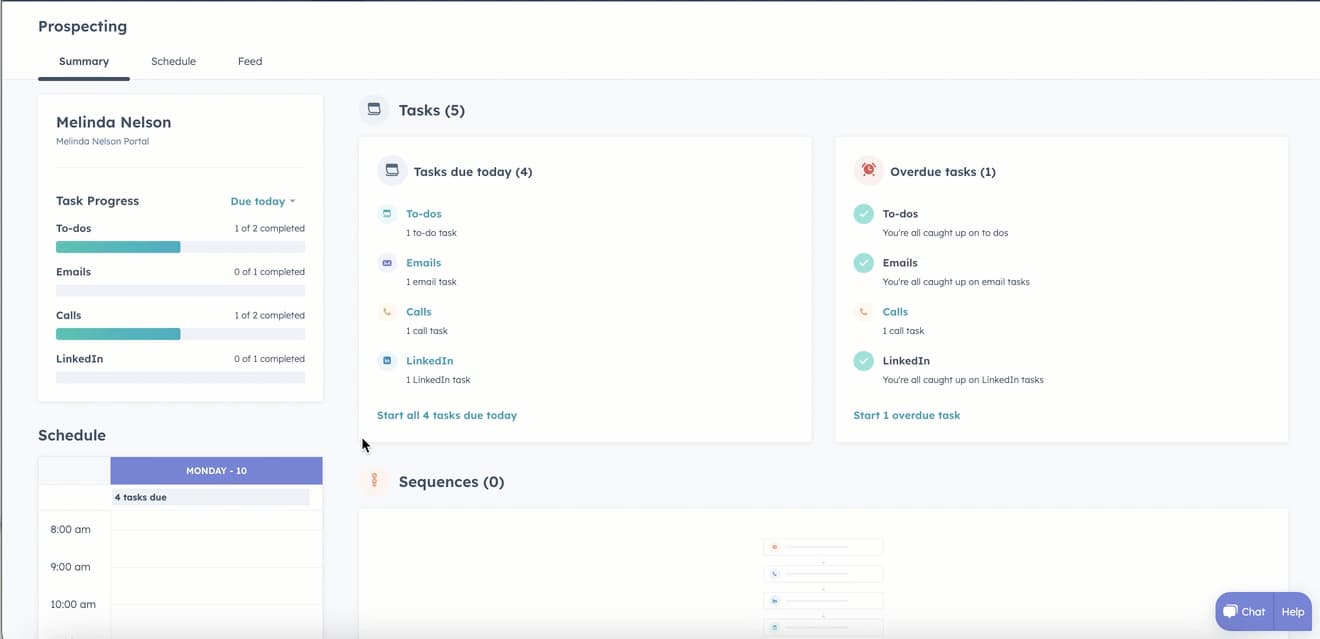
Source: HubSpot
Instead of getting bogged down in mundane administrative work, your sales team can spend their time engaging with prospects, understanding their needs, and building relationships that lead to closed deals.
5. AI-generated reports
An AI-powered CRM like HubSpot generates actionable insights from large volumes of data, supporting more strategic decision-making across various aspects of your business.
Improved reporting tools are a key feature of the new HubSpot AI and SalesHub announced at INBOUND 2023, delivering AI-generated sales reports for more robust and detailed insights into business performance.
.jpg?width=925&height=584&name=image%20(2).jpg)
Source: HubSpot
In addition, HubSpot unveiled a trio of advanced lead reports. Lead source reports and contact rate reports give marketers insight into the impact of their leads and give sales leaders visibility into how their reps are engaging with high-value leads.
Prospective activities reports provide sales leaders with a holistic view of rep outreach effectiveness, including conversion rates and activity metrics.
Using Sales Hub’s real-time reporting and visualization tools, you can also easily and quickly create your own customizable and visual reports. Use them to gain real-time updates on your pipeline, team performance, deal status changes, prospecting touches and conversions, and more.
How to choose the right AI-powered CRM solution
Choosing the right AI-powered CRM solution takes careful consideration, based on a whole range of factors: integration capabilities, customization, scalability, user-friendly interface, and robust security and data privacy measures.
But given AI’s unparalleled ability to analyze data, make predictions, and automate tasks, it’s no surprise that CRMs are quickly integrating AI capabilities into traditional workflows.
We see many sales leaders excited about the possibilities of AI, but they’re also so busy dealing with the day-to-day that adopting new these tools can seem daunting. A recent HubSpot survey of professionals across different business departments found that 81% agreed AI could help them spend less time on manual tasks, but only 14% agreed AI or automation tools were an important part of their current routine and role.
To help, we focused on 4 critical factors for choosing your AI solution:
1. Integration capabilities
An AI-powered CRM should be able to seamlessly integrate with any other tools and platforms that your team is already using, such as email clients, social media platforms, marketing automation tools, and ERP systems.
This will allow you to consolidate all your customer data in one place, enhancing efficiency and ensuring a unified view of each customer. If your various softwares can’t connect, inefficiencies and data silos will arise that could cancel out some of the benefits of AI-driven automation.
For example, HubSpot's CRM integrates well with a variety of business tools such as Gmail, Outlook, Google and Outlook Calendars, Slack, Salesforce, Zoom, Microsoft Teams, and many more.
At INBOUND 2023, HubSpot announced that HubSpot’s Smart CRM will now sync with LinkedIn Sales Navigator (still in private beta for now), bringing these two important data sources together for sales teams.
Whichever AI-powered CRM you choose, ensure that it plays well with the rest of your technology stack.
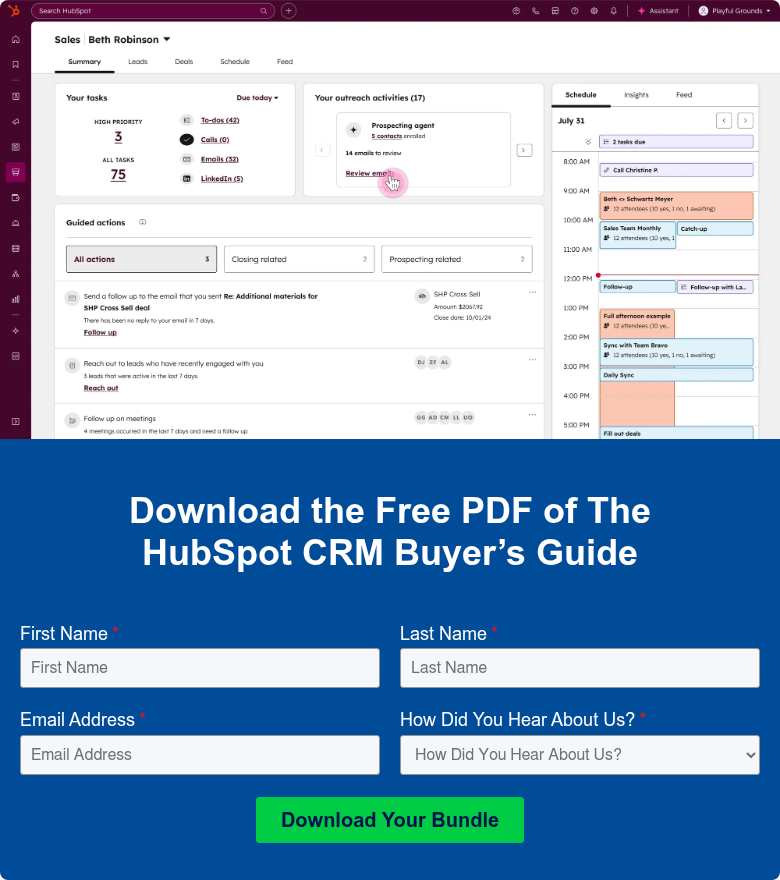
2. Customization and scalability
As any B2B sales team knows, markets are dynamic and your approach will evolve and grow over time. Your AI-powered CRM should be flexible enough to adapt to these changes, aligning not only with your current sales process but accommodating your future one.
It should be able to seamlessly scale to handle your expanding business’ increasing volumes of data and users without compromising performance. Your company may go through growing pains; your CRM shouldn’t.
HubSpot’s highly customizable and scalable platform excels at that. It’s got a suite of products, including Marketing Hub, Sales Hub, Service Hub, and CMS Hub, that work together seamlessly.
And rather than having to adjust your existing process for the new system, the system can be tailored (and expanded with new capabilities) to fit, including deal stages, specific data fields, and personalized views for different team members — since you want to make sure each person can work in the way that best suits them.
3. User-friendly interface
What good are the advancements of an AI-powered CRM if nobody on your team can figure out how to use it? A user-friendly interface is critical.
Sales professionals should be able to navigate the system easily and find the information they need without hassle. A complex or confusing interface will hinder productivity and lead to lower adoption rates among your team.
When evaluating CRM solutions, look for intuitive design, clear navigation, and accessible training resources. HubSpot is known for its clean, intuitive interface and comprehensive online learning resources.
4. Security and data privacy
In an era where data breaches are increasingly common, an AI-powered CRM solution should adhere to the highest standards of data security and comply with relevant data privacy regulations.
This includes features like data encryption, two-factor authentication, and regular security audits. It should also offer controls to manage and protect customer data in line with GDPR or other applicable data protection laws.
HubSpot takes data security seriously and provides a range of tools to help businesses comply with data privacy regulations. The platform’s security is driven not only by compliance and regulatory requirements, but also by industry best practices like the OWASP Top 10 and the CIS Critical Security Controls.
In case you’ve missed some of our blogs:
- How to Use PPC Advertising for B2B Lead Generation
- 4 Best Ways to Align Budgeting and Strategic Planning
- What is RevOps and How It Can Drive Growth for Your Business
- 7 Biggest Marketing Trends for 2024 and Beyond
- 3 Critical Stages of Business Growth & How to Handle Them
- How Our Company Breakthrough Day Changed Our Business
- Location-Based Marketing: Use Geotagging & Geofencing To Land Clients
Level up your sales strategy with new HubSpot Sales AI tools
If you’re looking to drive rapid growth for your organization, you need to not only evolve your sales process but the tools it depends on. AI-powered CRMs are the next step in evolution for B2B sales — and HubSpot is leading the way.
We can help you leverage the smartest tools out there, show you how to harness the power of HubSpot AI, and guide you to making strategic decisions that will win you business.
Interested in learning more about using an AI-powered CRM today?
Reach out to us to schedule a free consultation.

